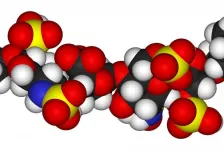(Press-News.org) Digital COVID-19 'symptom checkers' may stop some patients from getting prompt treatment for serious illness, suggests an international case simulation study, published in the online journal BMJ Health & Care Informatics.
Both the US and UK symptom checkers consistently failed to identify the symptoms of severe COVID-19, bacterial pneumonia, and sepsis, frequently advising these cases to stay home, the findings indicate.
The availability and use of symptom checkers is on the rise, and they are currently being used at a national level to pick up COVID-19 infection.
Identifying which patients with COVID-19 require treatment is difficult, because the infection can mimic common conditions that rarely require medical attention and because there are no clinical signs or symptoms that reliably predict who will progress to severe disease, note the researchers.
Digital symptom checkers combine a series of set questions and pre-determined responses to advise a person on the most appropriate course of action.
But as yet, there is hardly any evidence for the effectiveness or safety of symptom checkers for prioritising treatment (triaging) during a pandemic, say the researchers.
They therefore looked at the ability of national government-sponsored digital symptom checkers in use in Singapore, Japan, the US and the UK, to correctly triage people in need of a medical assessment and/or treatment.
The symptom trackers included: the Singapore COVID-19 Symptom Checker; Stop COVID-19 Symptom Checker (Japan); CDC Coronavirus Symptom Checker (US); and 111 COVID-19 Symptom Checker (UK).
COVID-19 death rates in Singapore and Japan are comparatively low; in the US and the UK they are comparatively high.
The researchers wanted to see if the symptom checkers were able to differentiate mild from severe COVID-19, and how well they picked up COVID-19 'mimickers' such as bacterial pneumonia and sepsis in 52 standardised case scenarios.
The cases simulated common COVID-19 related signs/symptoms of varying severity and risk factors. These included: cough and fever; a co-existing condition (high blood pressure) plus cough and fever; suppressed immunity as a result of drug treatment plus cough and fever; and shortness of breath and fever.
These four distinct presentations were then varied in relation to one or more of the following: how long since symptoms had started; the patient's age; and symptom severity.
The symptom checkers in Singapore and Japan triaged twice as many cases for direct clinical assessment as the symptom checkers in the US and UK.
Singapore had the highest overall referral rate at 88%; the US had the lowest at 38%. Among the simulated cases not referred, the USA and UK triaged a significant number that would typically have required early clinical assessment to 'stay home'.
The US symptom checker frequently triaged simulated cases with possible severe COVID-19, bacterial pneumonia, and sepsis to stay home and possible neutropenic (low white cell count after chemotherapy) sepsis to seek medical attention within 24 hours.
The UK's symptom checker frequently triaged possible severe COVID-19 and bacterial pneumonia to stay home with no follow-up and is likely to have delayed treatment for sepsis, severe COVID-19, and severe sepsis, point out the researchers.
While Japan's symptom checker generally performed well, the simulation revealed a potential delay to treatment for very severe sepsis. And none of the symptom checkers triaged simulated neutropenic sepsis to emergency care.
The researchers single out the UK's symptom checker for its complex algorithm, and for attempting to quantify symptoms such as shortness of breath and the overall severity of illness by asking subjective, qualitative questions with multiple choice answers.
The questions used to discriminate between degrees of severity aren't up to the task, they suggest.
Both the US and UK symptom checkers "are likely to delay presentations of serious medical conditions to appropriate care, and as such, are likely to confer an increased risk of morbidity and mortality," they warn.
"Both symptom checkers maintain a high threshold for referring onward to clinical contact, triaging the majority of patients to stay home with no clinical contact."
The researchers acknowledge that by reducing physical contacts, symptom checkers can potentially save valuable resources and reduce viral spread, and they require fewer resources than phone and telemedicine triaging services.
But their findings suggest that "whilst 'symptom checkers' may be of use to the healthcare COVID-19 response, there is the potential for such patient-led assessment tools to worsen outcomes by delaying appropriate clinical assessment," particularly if they are used as the only source of medical advice, they conclude.
"Our results support the recommendation that symptom checkers should be subjected to the same level of evidenced based quality assurance as other diagnostic tests prior to implementation," they add.
INFORMATION:
Externally peer reviewed? Yes
Evidence type: Case simulation study
Subjects: COVID-19 symptom checkers
PHILADELPHIA--Even before the COVID-19 pandemic, mental health issues have been on the rise across the nation, but many struggle to access the care they need. Collaborative care--a proven approach for improving psychiatric care--combats this issue by integrating mental health professionals into the primary care setting. Penn Medicine's collaborative care program, Penn Integrated Care (PIC), utilizes a centralized resource center to facilitate intake, triage, and referral management for all patients with mental health needs. A new study, published today in the Annals of Family Medicine, suggests ...
Juvenile white-tailed deer that strike out to find new home ranges -- despite facing more risks -- survive at about the same rate as those that stay home, according to a team of researchers who conducted the first mortality study of male and female dispersal where deer were exposed to threats such as hunting throughout their entire range.
Dispersal occurs when a juvenile leaves the area where it was born and moves to a new location where the young animal establishes its adult home range, explained Duane Diefenbach, Penn State adjunct professor of wildlife ecology. The instinctual dispersal of young deer from the area where they were born to a new home range protects the species' gene pool from inbreeding with close relatives.
Diefenbach's ...
Researchers have identified a critical mechanism that allows deadly bacteria to gain resistance to antibiotics.
The findings offer a potential new drug target in the search for effective new antibiotics as we face the growing threat of antimicrobial resistance (AMR) and infections caused by bacterial pathogens.
The study investigated quinolone antibiotics which are used to treat a range of bacterial infections, including TB (tuberculosis). Quinolones work by inhibiting bacterial enzymes, gyrase and topoisomerase IV, thereby preventing DNA replication and RNA synthesis essential to growth.
They are ...
Spectacular fossil plants preserved within a volcanic ash fall in China have shed light on an evolutionary race 300 million years ago, which was eventually won by the seed-bearing plants that dominate so much of the Earth today.
New research into fossils found at the 'Pompeii of prehistoric plants', in Wuda, Inner Mongolia, reveals that the plants, called Noeggerathiales, were highly-evolved members of the lineage from which came seed plants.
Noeggerathiales were important peat-forming plants that lived around 325 to 251 million years ago. Understanding their relationships to other plant groups ...
TROY, N.Y. -- Using a nanopore, researchers have demonstrated the potential to reduce the time required for sequencing a glycosaminoglycan -- a class of long chain-linked sugar molecules as important to our biology as DNA -- from years to minutes.
As published this week in the Proceedings of the National Academies of Sciences, a team from Rensselaer Polytechnic Institute showed that machine-learning and image recognition software could be used to quickly and accurately identify sugar chains -- specifically, four synthetic heparan sulfates -- based on the electrical signals generated as they passed through a tiny hole in a crystal wafer.
"Glycosaminoglycans are a complex repertoire of sequences, ...
An international team of scientists have explained how legume trees are key in liberating minerals locked in iron minerals and the benefits are passed on to nearby trees
The research shows that the trees are able to alter their soils microbiome in a way that increases access to nutrients and supports growth
The findings provide new insight into the role of these trees in safeguarding the function of tropical forests and sustainable reforestation
Researchers have found that nitrogen-fixing legume trees can support themselves and surrounding trees not only with increased access to nitrogen, but with other key nutrients through enhanced mineral weathering.
The team, led by the University ...
In the United States, one in 10 babies are born too soon, resulting in complications that can affect their locomotor development and influence such simple tasks as balance, walking and standing later in life. A new peer-reviewed study by Children's National Hospital, published in the Proceedings of the National Academy of Sciences of the United States of America (PNAS), explores exactly what neural circuitry of the cerebellum is affected due to complications that occur around the time of birth causing these learning deficits, and finds a specific type of neurons -- Purkinje cells -- to play a central role.
Up until now, there has been a sparsity of techniques available to measure neuronal ...
American adults without a college degree have experienced greater reductions in life expectancy when compared to their more-educated counterparts, USC and Princeton researchers have found.
The study reveals that after nearly a century of declining mortality up to the late 1990s, the progress continued into the 21st century for more-educated Americans but stalled for the population as a whole and reversed for the two-thirds of Americans who do not have a college degree.
The study appeared Monday in the Proceedings of the National Academy of Sciences.
The ...
Malaria is the deadliest pathogen in human history. Nearly half the people on Earth are at risk of contracting the disease from the parasites that cause it. But humans aren't the only ones who can get these parasites--different forms are found in other animals, including birds. By studying the DNA of those strains, scientists can get a better picture of how malarial parasites live, which may give clues on how to stop the disease. In a new paper in PNAS, researchers analyzed blood samples of more than 1,000 species of birds from the Andes looking for malaria; they found that the strains of malaria present in a local area don't always neatly align with the types of birds living there.
"Traditionally, we thought that there's ...
(Boston)--Despite the positive advances that anti-human immunodeficiency virus (HIV) therapy, commonly called anti-retroviral therapy (ART) or highly active antiretroviral therapy (HAART), has had on the life expectancy of HIV-positive people, finding a cure for HIV or acquired immunodeficiency syndrome (AIDS) has remained elusive.
"One of the major challenges in curing HIV is that there is a persistent latent reservoir of virus that is not targeted by current antiretroviral treatments and is hidden from immune cells. When treatment is interrupted, this reservoir of the virus allows the HIV ...



